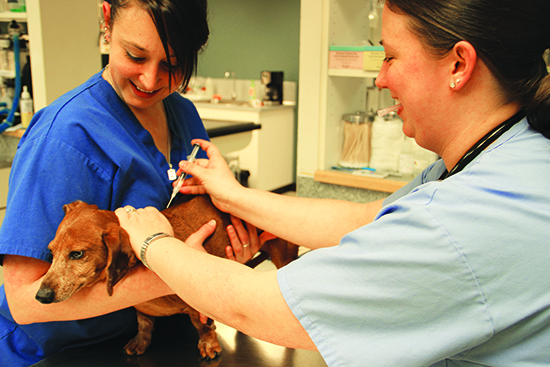By Niki Cleary, Tulalip News
It’s summer. The flowers are in bloom and the birds are singing and you decided to get your kids a puppy or kitten. Although you may be worried about potty training and chewing there are some common health concerns that should also be on your mind, first and foremost, vaccination.
“Starting at eight weeks old we recommend you start a vaccine series,” explained veterinarian Dr. Alina McLain. “It’s very similar to vaccines in people and prevents against normal puppy and kittenhood diseases that can be transferred between animals and are present in the environment.”
Booster shots have to be administered every three to four weeks afterwards.
“Diseases we’re most concerned about (in dogs) are distemper and parvovirus and rabies,” continued Dr. McLain. “Distemper and parvo are combined into one vaccine. Both diseases can be fatal to dogs. Rabies is required by law. Since rabies is 100% fatal to people, its one that the government cares about.”
The cost of vaccines varies from veterinary office to office. However, if you want to administer the vaccine yourself, vaccines can be purchased for less than $10 at animal supply stores.
“It’s hard to offer price,” said Dr. McLain. “If you get them at the Co-op vaccines cost $6.00, and it can cost $500-$600 to treat the diseases.”
Kennel cough, although not required, is recommended for dogs who are frequently in contact with other dogs.
“If the dog is going to boarding, it’s important,” said Dr. McLain. “Kennel cough is similar to the flu vaccine in people. It’s just as transmissible as the flu is in a person. In a vaccinated dog it can cause the sniffles. In an unvaccinated dog, it can cause pneumonia.”
Dr. McLain said it’s also important to vaccinate cats.
“Again there are three vaccines: feline distemper, feline leukemia and rabies,” she explained. “Feline leukemia is transmissable and comes from sharing water and food bowls. If an infected cat eats from the dish, then your cat eats food, they can get it. It’s very similar to leukemia or AIDS in people.
“There’s nothing we can do about it. We can’t make it go away and it lowers their immune system. A cold in a regular cat is not a big deal, a cold in a leukemia cat can be deadly.”
After their initial puppy and kitten shots, cats and dogs both need booster vaccinations once a year to be protected.
When is it time to go to the vet?
Use common sense and treat your pets like you would your kids, said Dr. McLain.
“If they vomit once or twice but are still perky, eating and drinking, don’t worry. But incessant vomiting or diarrhea for more than two or three days, lethargic or refuses food or water fro more than 24 hours means something is seriously wrong.”
Do not feed your pets human over the counter medications.
“Human drugs are not safe, they are often very toxic to your animals,” said Dr. McLain. “If you have a question about what’s safe, call your vet before you give it to your pet.”
If you have an emergency after hours, there are several emergency vets and 24/hour clinics in the area. Pilchuck Emergency clinic in Snohomish, Diamond Veterinary, and VSC specialty center in Lynwood can all help with after hours emergencies.
Www.veterinarypartner.com is a great resource for pet owners as well.
“The website is vetted by veterinarians,” said Dr. McLain. “It is monitored by veterinarians and the information there is good viable information.”

